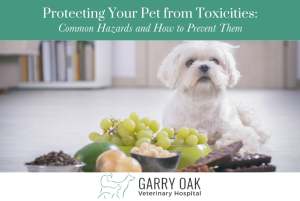 As pet parents, our primary goal is to keep our furry friends safe and healthy, but with the holiday season approaching, the potential for accidental poisonings increases. Additionally, living on the West Coast, near the ocean presents unique toxic hazards to pets. At Garry Oak Veterinary Hospital, we’re committed to helping you stay informed on common toxicities your pet may encounter and how to keep them safe.
As pet parents, our primary goal is to keep our furry friends safe and healthy, but with the holiday season approaching, the potential for accidental poisonings increases. Additionally, living on the West Coast, near the ocean presents unique toxic hazards to pets. At Garry Oak Veterinary Hospital, we’re committed to helping you stay informed on common toxicities your pet may encounter and how to keep them safe.
Understanding Toxicities in Pets
Toxicities occur when pets ingest, inhale, or come into contact with substances harmful to their health. For many substances, even a small amount can lead to serious health issues. Being aware of these risks is the first step in preventing accidents and safeguarding your pet’s well-being.
Common Toxins and How They Affect Pets
1. Salt Water Toxicity
- Risk: For pets who love to swim in the ocean, the ingestion of salt water can lead to salt toxicity. Dogs may swallow salt water while playing, fetching, or simply cooling off, leading to serious health consequences.
- Symptoms: Vomiting, diarrhea, lethargy, weakness, muscle tremors, and in severe cases, seizures and coma.
- Prevention: Limit ocean time and encourage drinking fresh water before and after swimming to reduce the risk of saltwater ingestion.
2. Chocolate
- Risk: As the holidays approach, chocolate treats become more common in households. Chocolate contains theobromine, a stimulant that is toxic to dogs and cats.
- Symptoms: Vomiting, diarrhea, increased heart rate, tremors, and even death in severe cases.
- Prevention: Keep all chocolate products out of reach, including wrapped gifts that may contain chocolate.
3. Holiday Foods and Ingredients
- Risk: Foods like raisins, grapes, and certain nuts (e.g., macadamia nuts) are highly toxic to pets. Many holiday recipes also contain onions, garlic, or spices that can harm pets. Holiday foods can also be rich and have high-fat content for our pets.
- Symptoms: Vomiting, diarrhea, tremors, seizures, pancreatitis and kidney failure.
- Prevention: Don’t allow pets to roam freely around holiday meals or buffets, and keep leftovers and garbage securely stored.
4. Alcohol
- Risk: Alcohol consumption can be extremely dangerous for pets, causing serious health effects even in small quantities.
- Symptoms: Vomiting, diarrhea, difficulty breathing, and potentially even coma or death.
- Prevention: Keep alcoholic beverages out of reach and be mindful of any spills at gatherings.
5. Household Plants
- Risk: Many holiday plants, such as poinsettias, mistletoe, and lilies, can be toxic to pets.
- Symptoms: Symptoms vary by plant but often include gastrointestinal upset, drooling, and lethargy.
- Prevention: Keep holiday plants out of reach or avoid having them in your home if possible.
What to Do in Case of Suspected Poisoning
If you suspect that your pet has ingested a toxic substance, contact us immediately at Garry Oak Veterinary Hospital at (250) 656-3955 or call the pet poison helpline at 1-800-213-6680. Do not attempt to induce vomiting or administer any treatments at home without consulting a veterinarian, as this may worsen the situation.
Comprehensive Q&A on Pet Toxicities
Q: How do I know if my pet has ingested salt water?
- A: Look for signs like excessive thirst, vomiting, or diarrhea. If your pet shows any of these symptoms after ocean playtime, call us right away.
Q: How much chocolate is too much?
- A: Any chocolate can be harmful, but darker chocolates contain more theobromine and are more dangerous. Contact us if your pet ingests any amount of chocolate, so we can assess the risk based on the type and quantity ingested.
Q: Can I give my pet some holiday leftovers?
- A: It’s best to avoid feeding your pet human food, as many holiday dishes contain hidden ingredients that can be toxic or too rich for pets. Stick to pet-safe treats instead.
Q: Are there any foods that are especially dangerous to cats?
- A: Cats can also be affected by chocolate, onions, and certain artificial sweeteners like xylitol. Additionally, lilies are extremely toxic to cats, causing kidney failure even if only a small amount is ingested.
Q: What should I do if my pet eats something toxic but isn’t showing symptoms?
- A: Contact us right away. Many toxins take time to show symptoms, so even if your pet seems fine, it’s best to have a professional evaluate the situation.
Q: Are all holiday plants dangerous to pets?
- A: Many popular holiday plants, like poinsettias and mistletoe, can be harmful to pets if ingested. Place these plants out of reach, or opt for pet-safe alternatives if you’re concerned.
Contact Us
At Garry Oak Veterinary Hospital, we’re here to help protect your pets during every season. If you have any concerns or need advice on pet safety, don’t hesitate to reach out.
📍 Garry Oak Veterinary Hospital
9837 Seventh St
Sidney, BC V8L 4B1
📞 Phone: (250) 656-3955
